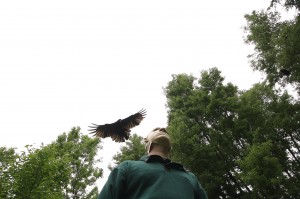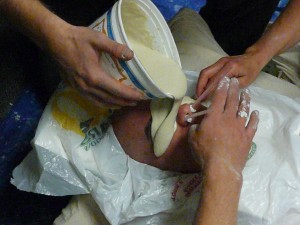
Like Ann, I’m a recent convert to the charm of crows. This has led to a running joke with my husband’s cousin, Roger. At family reunions, I tell him how much I like crows. He tells me how much he likes to shoot them.
Hilarious, right? Here’s the satisfying part: Crows remember Roger. They don’t just remember Roger’s suburban Seattle home and his BB gun. They also seem to remember his face. When he leaves his house, the crows mob him, diving and screeching around his head. (They leave other family members alone.) When this harassment — or retaliation — began, Roger took his campaign into a second-floor bedroom, where he crouched below a windowsill and poked his BB gun through a slit in the screen. But the crows have never forgotten his mug. Years after his last open attack on the noisy neighborhood flocks, he’s still Corvid Enemy Number One.
Now, I have some actual science to bring to our argument. In a paper released today in the Proceedings of the Royal Society B, ecologist John Marzluff and two of his students report that crows are past masters at holding a grudge.
Over the years, I’ve had several chances to write about Marzluff, a corvid researcher who works at the University of Washington — coincidentally or not, quite close to Roger’s neighborhood. I’ve followed Marzluff as he’s tried — with mixed success — to trap crafty crows in the suburbs, and I’ve reported on his and his colleagues’ efforts to turn urban Seattle into an ecological laboratory. Most recently, I wrote about his study of crows’ ability to recognize individual human faces:
To test the birds’ recognition of faces separately from that of clothing, gait and other individual human characteristics, Dr. Marzluff and two students wore rubber masks. He designated a caveman mask as “dangerous” and, in a deliberate gesture of civic generosity, a Dick Cheney mask as “neutral.” Researchers in the dangerous mask then trapped and banded seven crows on the university’s campus in Seattle. In the months that followed, the researchers and volunteers donned the masks on campus, this time walking prescribed routes and not bothering crows.
The crows had not forgotten. They scolded people in the dangerous mask significantly more than they did before they were trapped, even when the mask was disguised with a hat or worn upside down. The neutral mask provoked little reaction. The effect has not only persisted, but also multiplied over the past two years.
In today’s paper, Marzluff and his coauthors report that crows have an even longer memory for human faces than first thought: Crows have now mobbed the dangerous mask for a full five years, and scientists have observed the effect as far as 1.2 kilometers from the original campus study site. Apparently, the original seven crows have taught both their peers and their offspring to carry on their vendetta.
So crows can differentiate between Cheney and a caveman. So what? The researchers speculate that the ability to recognize and remember individual human faces may help crows survive in an increasingly human-dominated world.
The behavior of individual people towards animals is often changing, and recent studies have demonstrated that an ability to discern differences between humans may enable successful species to adapt to, and even coevolve with, human behavior.
Want to survive in the city? Know your enemies.

Whether or not a capacity for personal grudges has contributed to their survival, crows are thriving in Seattle. Thanks in part to expanding suburbs — and their delectable garbage — the local crow population has grown exponentially in recent decades, and suburbanites have become all too familiar with the birds’ raucous chorus.
Sorry, Roger. There goes the neighborhood. But take heart: Cheney masks are still in stock.
I would love to hear some raucous crows in my yard (in suburban Chicago) again. They were decimated by the West Nile virus in 2002 and have never returned.
I’m just not sure I buy face recognition as the go-to for crows in identifying individual humans. A weird, distinctive mask, sure they would remember that, and associated with bastards that trapped them and subjected them to various indignities. I think any self-respecting crow would identify and harass a bb gun toting douchebag that had troubled it before, even if his face were disguised somehow. The conclusion that crows are cuing into facial features of people as their main means of identifying is a little to cutesy and convenient to suit my skepticism. I think gait, silhouette, body type, would be more ready identifiers of the bad people than facial features are for crows. I reckon they hate anyone with the ‘bad’ mask just like they would learn to hate anyone with a bb gun, once they made the connection.
Hi Cary, I agree, it makes sense that crows would use gait, body type, etc. to identify their enemies (not to mention big clues like, um, the presence of a BB gun … ) But Marzluff’s results indicate that crows notice facial features, too. The mask study compared crows’ reaction to a “threatening” mask — the mask worn by researchers when they trapped those original 7 crows — vs. a “neutral” mask, not a threatening mask vs. no mask. And many different people wore the masks during the study, with no change in effect, so the crows seemed to be cuing in not on an individual’s gait or silhouette but on the particularities of the threatening mask.
It’s very interesting. If the crows are able to recognize faces with a lot of nuance, they could start working TSA checkpoints.
Good idea. But they are scavengers … don’t you think they’d be a little too interested in everyone’s junk?